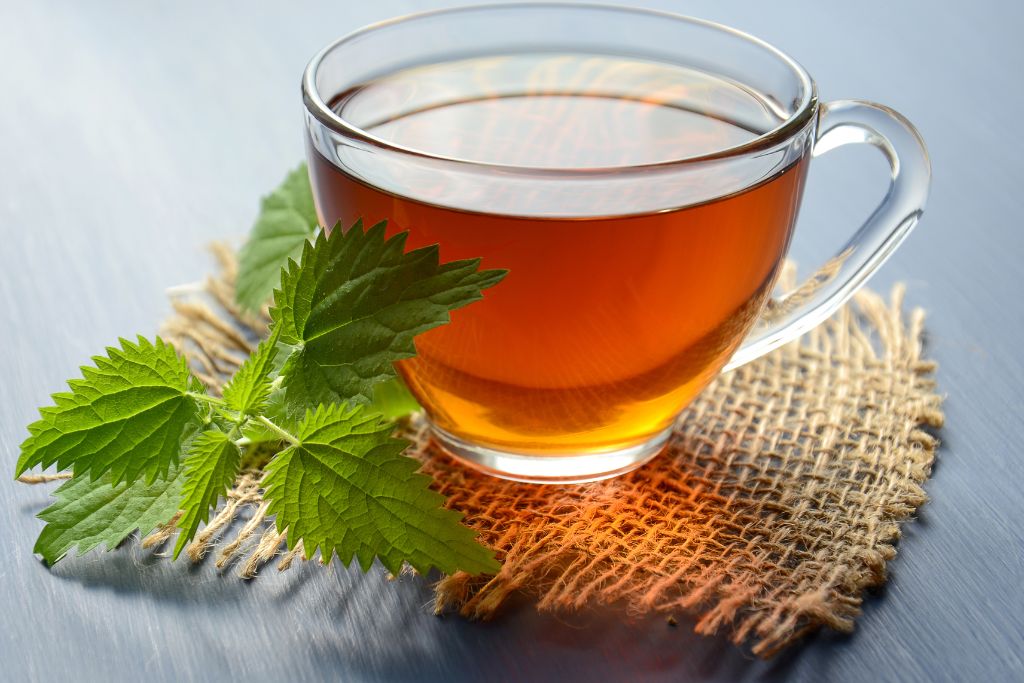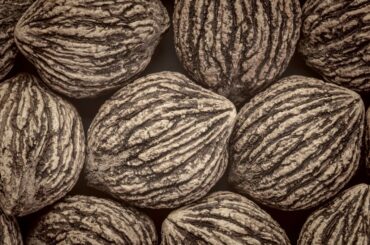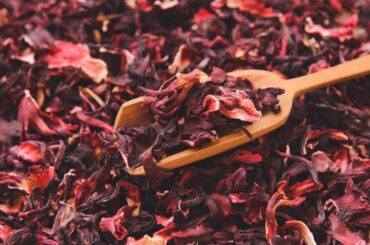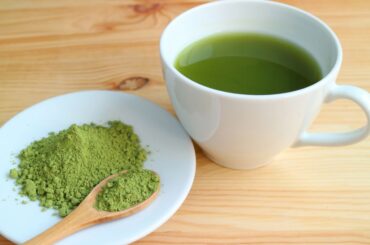Are you curious about the secrets to making the perfect ginseng tea? Wondering how this ancient brew can benefit your health and well-being? Well, look no further! In this article, we’ll dive into the fascinating world of ginseng tea, revealing its rich history and incredible properties.
Did you know that ginseng tea has been treasured for centuries in traditional Chinese medicine? This is because of its numerous health benefits.
If you are interested in improving your general health and value the use of natural remedies, then this article was written just for you!
What is Ginseng Tea?
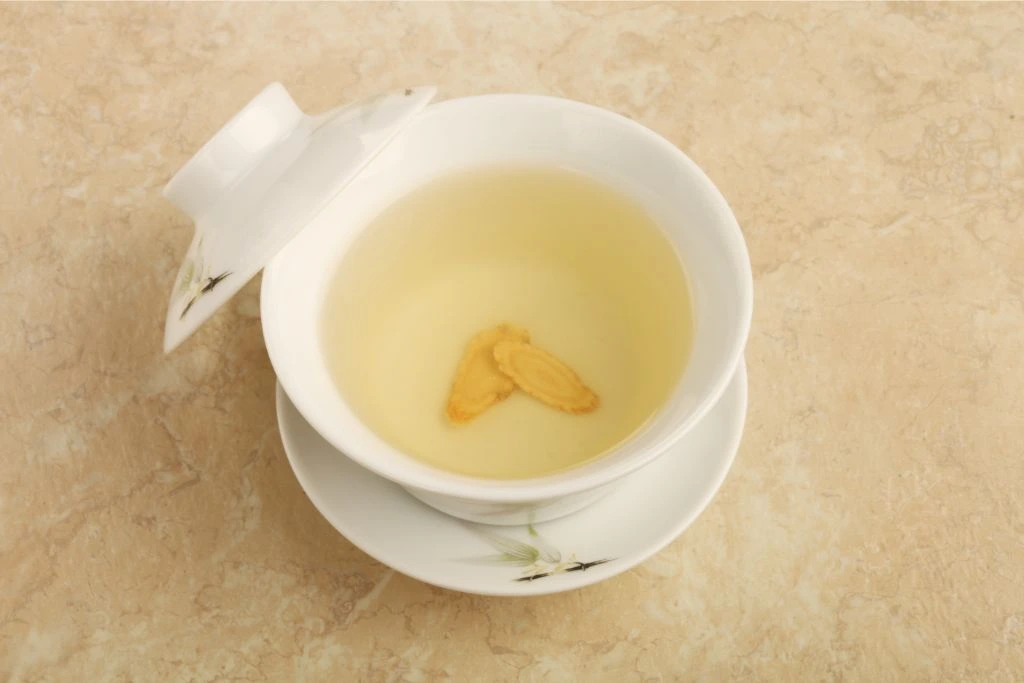
Ginseng is renowned for its healing properties. It is predominantly grown in regions such as Northeastern China, Korea, and certain parts of North America.
The herb’s potency is often associated with specific growing conditions. An example is these locations’ sandy soils and cool climates. This makes them the ideal grounds for cultivating this precious plant.
This extraordinary brew is crafted by infusing sliced or crushed ginseng roots into hot water. The resulting beverage boasts a subtle, earthy flavor with a slightly bitter note.
It delivers a unique and refreshing experience for tea enthusiasts. Ginseng tea is a must-try elixir that promises both enjoyment and well-being.
What Part of Ginseng is Used for Tea?
The star in ginseng tea is none other than the prized root of the ginseng plant. This precious root, known for its healing properties, is the main ingredient in this delightful tea. Harvested and carefully prepared, the ginseng root is sliced or crushed.
This allows its essence to infuse into hot water. It creates a wholesome and refreshing beverage. So, when you indulge in a cup of ginseng tea, you’re savoring the very essence of this ancient and revered plant, brimming with natural goodness.
What Does Ginseng Tea Taste Like?
Ginseng tea offers a genuinely unique and refreshing taste experience. The flavor profile of this delightful brew can be described as earthy, with subtle bitter undertones. A pleasant natural sweetness balances this.
When sipping ginseng tea, you may notice a refreshing and slightly herbal note that lingers on your palate. The taste is not overpowering, making it a perfect choice for those who enjoy milder yet distinct flavors.
Ginseng tea will surely delight your taste buds if you’re seeking a rejuvenating cup of tea that provides comfort and excitement.
What is Ginseng Tea Good for?
Ginseng tea is renowned for its potential health benefits. This makes it a popular choice for those seeking a natural boost to their well-being. This refreshing tea supports improved energy levels and mental focus.
It helps combat fatigue and enhance cognitive function. Additionally, ginseng tea is often cherished for its potential to strengthen the immune system and promote vitality. As a source of antioxidants, it may aid in reducing oxidative stress and supporting a healthy heart.
Ginseng Tea Ingredients
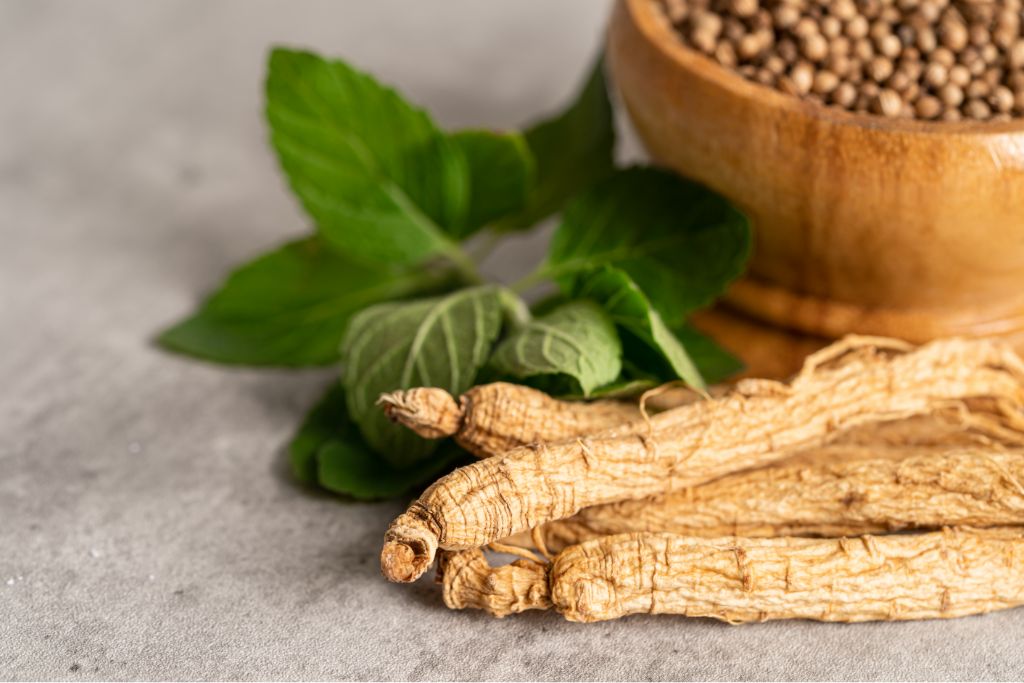
Let’s explore the key components that make this invigorating brew so unique.
Crafting ginseng tea is a delightful process that involves a handful of simple yet essential ingredients. After the elements, we will move on to the detailed guide on preparing this revitalizing elixir, “ginseng tea recipe.”
Ginseng Root
The star of the show! Select high-quality dried ginseng root, either whole or sliced, to infuse its rich essence into your tea. This ingredient is not optional, as it forms the heart of ginseng tea.
Water
Use fresh, clean water to create the tea base. Opt for filtered water if possible to ensure the purest taste.
Honey (Optional)
You can add honey as an optional ingredient for a touch of sweetness. This complements the earthy notes of the tea, providing a harmonious balance of flavors.
Lemon (Optional)
If you prefer a hint of citrusy tang, consider adding a slice of lemon to your ginseng tea. This optional ingredient adds a zesty twist to the brew.
Other Herbs (Optional)
To experiment with flavors and enhance the tea’s benefits, you can explore adding herbs like ginger or licorice root. These optional ingredients can add complexity to the taste and enrich the experience.
Ginseng Tea Recipe Guide
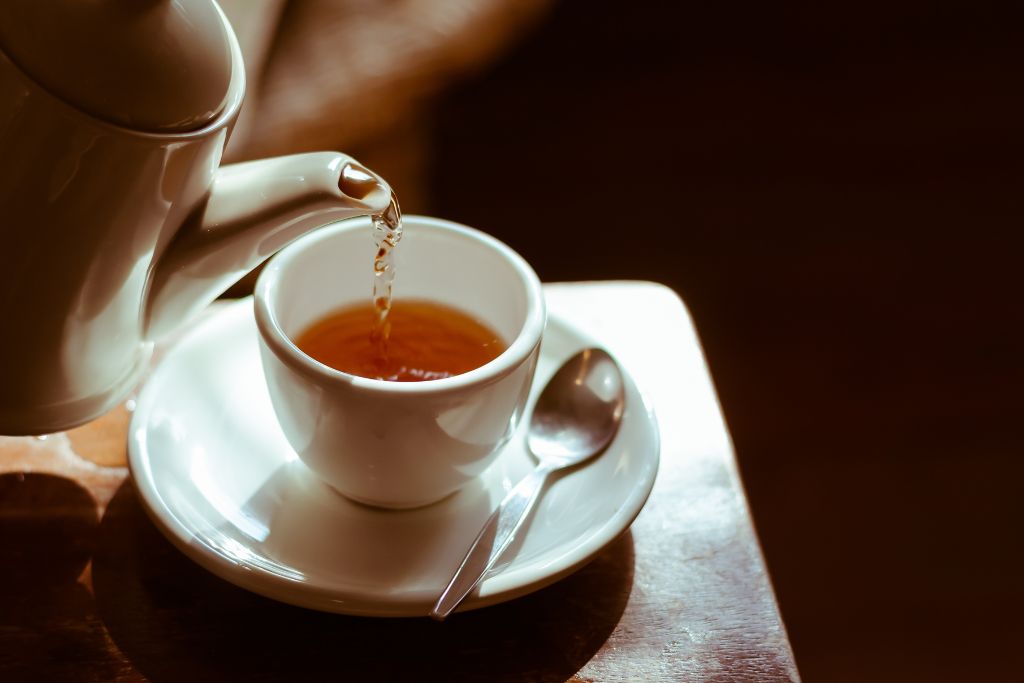
Ginseng tea is a delightful beverage and a fantastic way to experience the potential health benefits of this remarkable herb. So, sit back, relax, and learn how to make ginseng tea.
- Measure the Ingredients
Start by measuring the desired amount of ginseng root needed for your tea. Approximately 1 to 2 grams of dried ginseng root per cup of water is a standard ratio, but you can adjust it according to your preference. If you wish to add honey or lemon, also have them ready.
- Boil the Water
Bring the water to a rolling boil in a clean pot or kettle. For one cup of tea, about 8 ounces of water should suffice. Use filtered water if available for the best taste.
- Add the Ginseng Root
Carefully place the measured ginseng root into the pot once the water is boiling. Reduce the heat to a gentle simmer, and let the root steep for about 20 to 30 minutes. This slow infusion releases the ginseng’s beneficial compounds into the water.
- Sweeten and Flavor
Add honey or a slice of lemon to the steeping tea, if desired. Stir well to incorporate the sweetness or citrusy tang into the blend. This step is entirely optional, depending on your taste preferences.
- Strain and Serve
Use a fine mesh strainer or a tea infuser to strain the tea into your cup after the steeping time. Discard the used ginseng root. Your delicious ginseng tea is now ready to be savored and enjoyed!
- Experiment with Additional Herbs (Optional)
Add other optional herbs, like ginger or licorice root, during the steeping process for a more adventurous blend. Remember that these optional ingredients can add unique flavors and additional health benefits.
Tips for Making Ginseng Tea
It’s time to equip you with helpful tips for a delightful and flavorful experience.
Crafting this refreshing brew is a rewarding process, and these tips will enhance your tea-making skills, making each cup a true delight.
Following these tips, you’ll master the art of preparing ginseng tea and create a soothing cup that invigorates your mind, body, and soul.
Choose High-Quality Ginseng
The key to a great ginseng tea lies in the quality of the ginseng root. Look for dried ginseng root from reputable sources, ensuring it is free from additives or contaminants. Selecting high-quality ginseng will guarantee a more potent and flavorful tea.
Patience is Key
When steeping ginseng tea, exercise patience. Allow the root to simmer in hot water for at least 20 to 30 minutes. This gentle infusion process ensures that the tea absorbs the maximum benefits and flavors of the ginseng root, resulting in a more satisfying brew.
Experiment with Flavors
While ginseng tea offers a unique taste, don’t hesitate to experiment with additional flavors. Add a touch of honey for sweetness or a slice of lemon for a zesty twist. Explore other optional herbs like ginger or licorice root to customize your tea blend according to your taste preferences.
Don’t Over Boil
Avoid overboiling the ginseng root. Excessive boiling can lead to a bitter taste, which may overpower the delicate earthy flavors. Keep the water at a gentle simmer throughout the steeping process.
Mind the Dosage
Ginseng is known for its potency, so it’s essential to mind the dosage. Avoid excessive consumption, especially if you are new to ginseng tea. Start with smaller amounts and gradually increase as you become accustomed to its effects.
Savor Mindfully
When your ginseng tea is ready, take a moment to savor each sip mindfully. Let the warm and refreshing elixir awaken your senses, and appreciate its natural goodness.
Ginseng Tea Nutritional Facts
Ginseng tea is an exciting drink that may be good for your health and has a lot of antioxidants. Depending on the ingredients and how it’s made, the exact nutritional values can vary, but here are some common estimates for an 8-ounce serving:
- Calories: 5-10 calories
- Carbohydrates: 1-2 grams
- Protein: 0 grams
- Fat: 0 grams
- Saturated Fat: 0 grams
- Cholesterol: 0 milligrams
- Potassium: 0 grams
- Sugar: 0 grams
- Vitamin C: 0 milligrams
- Calcium: 0 milligrams
Disclaimer: It’s important to note that these estimates are based on typical serving sizes and may vary depending on the specific preparation method and any additional ingredients or sweeteners you may add. If you include sweeteners or high-fat milk, it can increase the tea’s calorie and sugar content.
Overall, ginseng tea can be a delightful and potentially beneficial addition to your beverage repertoire. Its rich antioxidant content makes it an appealing choice for those seeking a healthy and refreshing drink.
Ginseng Tea Benefits
Discover the remarkable benefits of ginseng tea that have captivated tea enthusiasts for centuries. Embrace the goodness of ginseng tea and indulge in its revitalizing effects. Incorporating this tea into your daily routine may make you healthier and more energetic.
Let’s explore six excellent benefits that ginseng tea has to offer.
Enhanced Energy and Focus
Ginseng tea is often hailed for its natural ability to boost energy levels and enhance mental focus. The active compounds in ginseng root may help reduce fatigue and improve cognitive function, keeping you alert and sharp throughout the day.
Immune System Support
Ginseng tea can provide a valuable boost to your immune system with its rich antioxidant content. Regular consumption may strengthen your body’s defenses and promote overall health.
Stress Relief
Ginseng tea possesses adaptogenic properties, which may help the body adapt to stress and restore balance. Sipping on a soothing cup of ginseng tea can offer relaxation and a sense of calm.
Blood Sugar Regulation
Ginseng tea might be helpful for people with diabetes or those at risk of it. Studies suggest it could help manage blood sugar levels.
Anti-Inflammatory Properties
The active compounds in ginseng root exhibit anti-inflammatory properties, which could help reduce inflammation and alleviate certain inflammatory conditions.
Antioxidant Protection
Ginseng tea is packed with powerful antioxidants that do wonders for your body. These fantastic compounds battle free radicals and oxidative stress. It protects your cells from harm and supports healthier aging and well-being.
FAQs
Are There Any Side Effects of Ginseng Tea?
Yes, there can be side effects associated with consuming ginseng tea. It is essential to consume ginseng tea in moderation and be mindful of any adverse reactions.
Is it Okay to Drink Ginseng Tea Every Day?
No, it is best not to drink it daily for an extended period. Prolonged and excessive consumption may lead to adverse effects. This includes elevated blood pressure or nervousness.
How is Ginseng Tea Made?
The dried ginseng root is steeped in hot water to make ginseng tea, allowing its essence to infuse into the liquid. The root can be either sliced or crushed before steeping. The tea is then strained, and optional ingredients, like honey or lemon, can be added for flavor.
Who Should Not Take Ginseng?
Individuals with certain medical conditions should avoid consuming ginseng without consulting their doctor. Pregnant or breastfeeding women should also avoid using ginseng. This is because its effects on fetal development and nursing infants still need to be understood.
What are the Negative Side Effects of Ginseng?
Adverse side effects of ginseng may include digestive problems, headaches, restlessness, or fluctuations in blood pressure.

